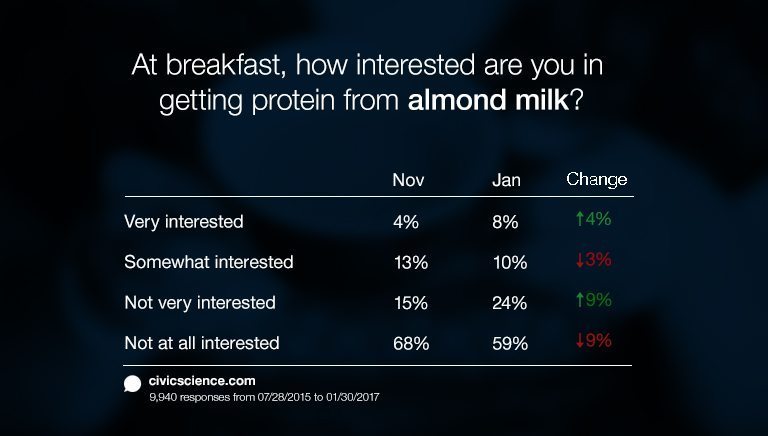In the midst of a changing society, there are other less divisive changes to take note of as well. Yes, we’re talking about almond milk. The non-dairy milk substitute has been all but overlooked over the past few months, despite rapid growth in sales. Today we break that infamous streak.
It’s not all good news for almond milk, but there’s hope yet. From November 2016 to January 2017 alone, we noticed significant attitudinal changes. There was a 4% rise among those who say they are “Very interested” in getting protein from almond milk at breakfast. Perhaps this could be due to new and ongoing research surrounding the benefits of non-dairy milk.
Further, there was a 9% drop in those who say they are “Not at all interested.” It seems those 9% may have switched to the “Not very interested” group, which grew by a corresponding 9%.
It could be a stretch, but in our book “Not very interested” is a whole lot better than “Not at all interested.” At least people are a little more willing to try almond milk than a few months ago.
And according to our data, there are only 20% of consumers who are “Very interested” in getting protein from dairy at breakfast, which has been at a plateau for some time. So it seems that non-dairy may begin to catch up.
But, how?
Well, those who say they are “Not very interested” in getting protein from almond milk at breakfast are more likely to favor restaurants with healthy menu options, more likely to donate to environmental charities, and more likely to earn between $50k and $100k each year.
So, almond milk manufacturers may want to emphasize the product’s environmental benefits (not without certain environmental flaws, of course), along with its potential health benefits, in order to bring in future almond milk fans.
Interested in other food insights? Check out our recent posts on the ongoing battle between Kelloggs and Breitbart.com, the growing trend of food sustainability, and how fast food can be saved by infrequent diners!









